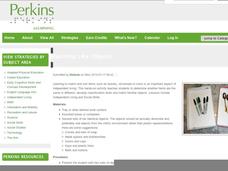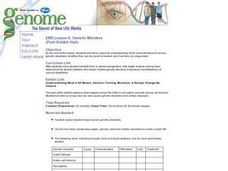Museum of Disability
Rolling Along
Kindness and empathy can be as important as reading comprehension skills, especially for younger learners. Reinforce both with a lesson based on Rolling Along: The Story of Taylor and His Wheelchair by Jamee Riggio Heelan. As...
Curated OER
Simple Preparation Can Improve Reading Comprehension
Reading comprehension is key to success in nearly every subject in school, but how do you improve comprehension in a pupil with dyslexia? Here are several tips that define ways in which educators can provide strategies to improve overall...
Do2Learn
Reading Form
Help kids keep track of their reading and comprehend literary texts with a straightforward graphic organizer. Pupils note down the setting and characters as well as four events from the text.
Museum of Disability
Don't Laugh at Me
You can prevent bullying in your classroom by addressing kindness, empathy, and acceptance with your littlest learners early on. After reading Don't Laugh at Me by Steve Seskin and Allen Shamblin, kids discuss the ways that words can...
Museum of Disability
A Picture Book of Louis Braille
Teach kids about the beginnings of the Braille writing system with a instructional activity about Louis Braille. A series of discussion questions guide young readers though A Picture Book of Louis Braille by David A. Adler, and once they...
Museum of Disability
Buddy, The First Seeing Eye Dog
Learn about how the seeing eye dog program began with a reading lesson about Eva Moore's chapter book, Buddy, The First Seeing Eye Dog. With vocabulary words, discussion questions, and extension resources, the lesson is a great way for...
Museum of Disability
Taking Visual Impairment to School
What is the world like when you can't see, or when your vision is impaired? Learn about how Lisa communicates with the world around her with Taking Visual Impairment to School by Rita Whitman Steingold. Learners answer discussion...
Museum of Disability
Stand in My Shoes
Stand in My Shoes, a story by Bob Sornson, is an effective way to teach young learners about empathy and making friends. Once pupils read through the story, they answer a series of discussion questions and complete reading activities...
Curated OER
My Insect Report
Is your class writing a report on insects? If they are, you have to check out this great set of worksheets. It provides a well-scaffolded system they can use to organize their research findings in order to compose a well-structured...
Alabama Learning Exchange
Investigating School Safety and Slope
Learners investigate the slope of various stairways through a "news report" approach and employ mathematical knowledge of applied slope to report on wheelchair accessibility and adherence to Americans with Disabilities Act. They...
Curated OER
Hearing Handicap
Students examine the effects of hearing loss. In this lesson on physical disabilities, students survey five older adults on hearing impairments. Students pool their data and compare their results with the results from other studies about...
Curated OER
Disability in the Media
Students look at websites about Down Syndrome and respond to how the media has impacted this disability on society. In this Down Syndrome lesson plan, students respond to different situations on worksheets.
Do2Learn
Story Organizer
Kids can get all their plot points in line by filling out this graphic organizer with information from a story they have read. Pupils note down the title and author, the characters, the setting, and four events from the story.
Reed Novel Studies
Out of My Mind: Novel Study
Have you ever felt trapped in your own body? That is likely how Melody in Sharon M. Draper's Out of My Mind feels. As scholars read to find out how Melody finally expresses herself, they complete sentences with new words, describe...
Perkins School for the Blind
Matching Like Objects
Same and different, sorting, and tactile discrimination are what's on the agenda for today. The class practices sorting objects and attempts to determine which objects are the same and different and why. The purpose is to increase...
Perkins School for the Blind
Conductors of Heat - Hot Spoons
Why is the end of a spoon hot when it's not all the way in the hot water? A great question deserves a great answer, and learners with visual impairments will use their auditory and tactile senses to get that answer. A talking...
Perkins School for the Blind
Conservation of Mass
How do you teach a student with visual impairments about the conservation of mass? You use tactile models that represent the theoretical concept. Baking soda and vinegar are used to add gas to a deflated balloon. Learners will feel the...
Perkins School for the Blind
The Mystery Box - Making Observations and Collecting Data
Making observations and collecting qualitative and quantitative data is a vital skill all scientists need to practice. Help your scientists with partial and no sight learn how to use their other senses to make observations for...
Perkins School for the Blind
Safety Crash Testing
Everyone knows that cars have safety features, but wouldn't it be fun to design your own? Learners with visual impairments build a ramp and then attempt to use the material provided to design a safety system to protect a raw egg from a...
Curated OER
Genetic Mistakes
Learners explore genetic disorders. They examine the genetic structure to physicial manifestations of various disabilities. Using internet sources, students analyze the characteristics of genetic disorders, whether they can be cured or...
Curated OER
What is Probability?
Learners participate in a variety of activities in order to understand the concept of probability. The students are engaged because of the application of The Multiple Intelligences Theory.
Curated OER
Function Lesson Plan -- Asking for Repetition
Students with disabilities are tested in the use of language and taught the skill of asking for repetition in order to gain clarification and thus improve comprehension. They are assessed according to the practice of asking with...
Curated OER
Failure-Proof Writing: Assignments for the Student Who Can't/Won't Write
Young scholars with learning disabilities are introduced to the techniques of proper writing. After completing a warm up, they practice writing about what they saw to determine where they are at in the process. In groups, they complete...
Curated OER
Hereditary Defects: Down Syndrome and Sickle Cell Anemia
Students solve problems like the following examples: 1. If you have 10,000 women, age 30, who have babies and one in 900 of these births will result in a Down syndrome baby, how many will have this disease? 2. 5,000 babies are born;...

























